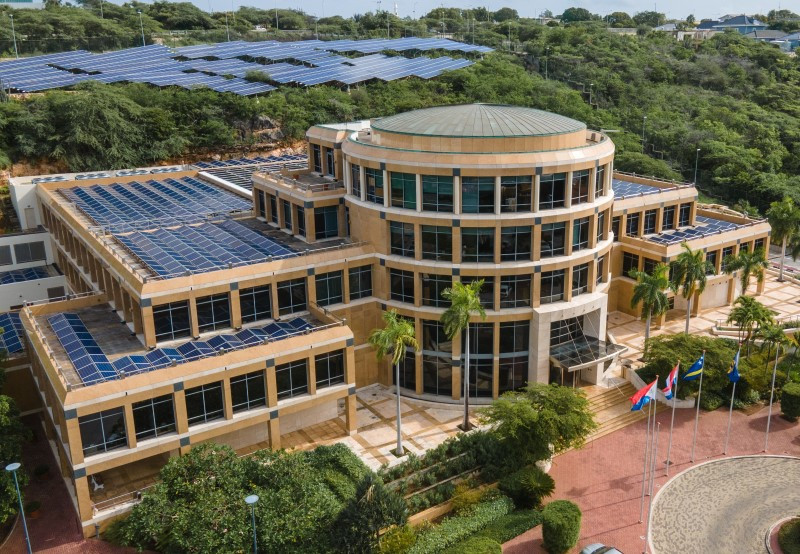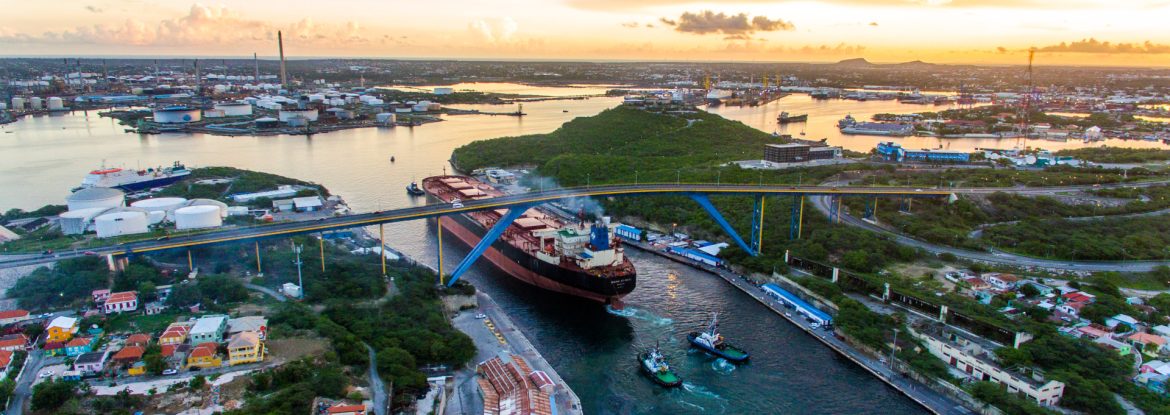Curaçao Ministry of Economic Development
Charting a Resilient Future
Minister Ruisandro Cijntje’s Vision for Curaçao’s Economic Evolution
In the face of global challenges and changing economic landscapes, Curaçao stands resolute in its commitment to diversify and fortify its economic foundations. Minister Ruisandro Cijntje, spearheading the Ministry of Economic Development, emerges as a key driving force behind the transformation outlined in Curaçao’s National Export Strategy (NES). His recent statement underscores the critical importance of adapting to global changes for sustained growth, emphasizing the NES as more than a plan—a dedicated commitment to navigate the future and ensure sustainable prosperity.
International trade has long been a vital force in shaping the prosperity of Curaçao, fostering the exchange of ideas, technologies, and cultures. Historically, the island served as a hub for transatlantic shipping and privateering, boasting strategic deep-water ports, abundant salt deposits used for food preservation, and a defensible harbor. As Minister Cijntje points out, “Even though not a nice story, it proves the strategic geographic location and natural deep-sea harbors that gave us an edge as a strategic hub.”
In the early twentieth century, the discovery of oilfields in the northern part of the Bolivarian Republic of Venezuela attracted significant investments to the region. Refining became a major economic segment, contributing significantly to the island’s revenue for more than a 100 years. However, the impact of U.S. sanctions on Venezuela and the aging refining infrastructure in Curaçao have hampered its ability to refine oil, resulting in a significant decline in the contribution of oil refining to the domestic economy in recent years.
During the mid-twentieth century, Curaçao developed a thriving financial services industry. The relocation of Dutch multinational corporations to Curaçao just before World War II, along with the extension of a double tax agreement between the United States and the Netherlands in 1955, facilitated the growth of offshore businesses. However, legal changes in the 1980s and beyond led to the decline of the offshore industry.
The success of the oil refining business and the financial services sector in the mid-twentieth century contributed to a rise in tourism, which has become one of the main sources of income for the island, supporting approximately one-third of economic activity. Despite recent exponential growth, the tourism industry remains a vulnerable sector. This economic evolution has shaped Curaçao’s unique and open culture, reflected in its multilingual population, diverse traditions, and welcoming attitude towards visitors and workers from around the world.
Curaçao is currently facing a large current account deficit, primarily driven by a trade in goods deficit, partially offset by a positive trade in services balance. This deficit underscores the central challenge in the island’s economy: the need to grow sectors generating foreign currency to maintain the ability to import goods and services crucial for business productivity.
Recognizing the changing global landscape and the imperative for economic diversification, the National Export Strategy (NES) aims to address these challenges. While historical pillars like oil refining, international financial services and Tourism have served well, the NES emphasizes the importance of broadening sources of well-being and prioritizing sectors with strong potential for foreign exchange earnings.

The NES identifies seven priority sectors for export potential: the blue bioeconomy, creative industries, education services, financial services, information technology services, Medical and Wellness Tourism, and port and maritime services. These sectors not only hold export potential but also offer opportunities for creating linkages, fostering a strong and resilient economy.
To support these efforts, the NES includes trade support strategies such as skills and entrepreneurship development, trade and investment promotion, trade information dissemination, and trade facilitation. These strategies aim to revitalize Curaçao’s business environment, lower the cost of doing business, promote local entrepreneurship and innovation, and position the country as an attractive destination for business investment.
The NES represents a critical development project for Curaçao, endorsed by the Council of Ministers in May 2022, indicating strong political support. It is a comprehensive plan emphasizing the need for a diversified and resilient economy in the face of challenges like the COVID-19 pandemic and the decline of traditional economic pillars.
The implementation of the NES will require collaborative efforts from all stakeholders, with a focus on legislative agility, institutional alignment, digital technology leverage, reduced bureaucratic hurdles, and workforce education for current and future jobs. As Curaçao embarks on this journey, the NES is not just the government’s strategy; it is the country’s strategy, inviting every Curaçaoan to contribute to its success. With determination and perseverance, Curaçao aims to cultivate a sustainable and prosperous path, preserving its unique dushi culture well into the future and becoming a place where businesses succeed and thrive.
In addition, new game-changers for Curaçao include IT Services and the Blue Bio Economy. Curaçao is home to Blue NAP Americas, the most advanced Tier IV data center in the Caribbean region, offering a full suite of services, including infrastructure co-location, private cloud, disaster recovery, and professional services. The vision is to become the premier and trusted digital hub for the Americas. Curaçao, as a member of the Dutch Kingdom and located in the Caribbean, serves as a gateway to the Americas and Europe, boasting favorable laws, a central location with limited natural disasters, and multilingual skills facilitating communication.
Another game-changer is the Blue Bio Economy. Sustainable marine bioprospecting holds the potential to increase Curaçao’s biotechnology capacity and develop new biobased industries. This initiative also serves as an enabler for the development of Curaçao’s NES priority sectors, such as tourism, education services, and port and maritime services.
In the short term, Curaçao aims to capitalize on its unique genetic and biochemical pool of marine biomes through collaborative projects involving research institutions, university spin-offs, incubators, and contract research organizations. Hosting leading national and international conferences on marine biotechnology makes Curaçao attractive to major players in the pharmaceutical industry. In the medium term, the plans for a cutting-edge underwater research station, PROTEUS™, by 2026, are expected to attract global players in the marine biotechnology market and large research institutions.
Collaborating with public, private and civil society stakeholders and drawing on technical support from the International Trade Centre, the NES emerges as a forward-looking approach to economic development. Acknowledging challenges posed by climate change, the global impact of the COVID-19 pandemic, and economic dependencies, Minister Cijntje positions the NES as a transformative blueprint. It goes beyond replacing old economic pillars; it’s about fortifying the foundation by embracing new dimensions, creating a resilient framework for future challenges.
Minister Cijntje accentuates the holistic vision behind these sectors, emphasizing their interconnection to form the backbone of a robust and resilient economy. In his words, “Our vision is holistic. By integrating these sectors, we aim to create a robust and resilient economy that thrives on synergy.”
Minister Cijntje emphasizes the urgency of reducing bureaucratic hurdles, embracing digital technologies, and aligning the institutional ecosystem to create a business-friendly environment. “We’re committed to revitalizing our business landscape. By cutting red tape, leveraging technology, and supporting innovation, we aim to attract investment and promote economic growth,” states Minister Cijntje.

A Call for Shared Responsibility
Looking ahead, Minister Cijntje underscores the shared responsibility of every Curaçaoan in NES implementation. Beyond a government initiative, it’s a national effort demanding commitment, focus, and perseverance from the entire community. “Success depends on us all. The NES is an invitation for every Curaçaoan to actively contribute to a sustainable and prosperous future, preserving our unique ‘dushi’ culture,” affirms Minister Cijntje.
As Curaçao navigates towards sustainable prosperity, Minister Ruisandro Cijntje and the Ministry of Economic Development lead the charge, steering the island through collaboration, determination, and a shared vision. The NES serves not just as a plan but as a guiding compass, ensuring that Curaçao’s spirit continues to flourish in a future where businesses succeed.
The government is also exploring opportunities in floating wind development to produce green hydrogen for exports, marking a new chapter in Curaçao’s economic evolution. This strategic move aligns with the global shift towards sustainable energy solutions and positions Curaçao as a forerunner in the Caribbean region.
Moreover, the focus on agriculture is integral to Curaçao’s future sustainability. By recognizing the potential of this sector within the Ministry of Economic Development, Curaçao aims to achieve food security, create employment opportunities, and contribute to a more diversified and resilient economy. Minister Cijntje highlights, “Development in Agriculture will not only boost our economy but also enhance our self-sufficiency and reduce our dependence on imports.”
Furthermore, the ambitious plans for floating offshore wind farms indicate Curaçao’s commitment to green energy. By harnessing the power of the wind to produce green hydrogen, the island not only contributes to reducing its carbon footprint but also opens new avenues for export. Vanessa Toré, Director of International Economic Cooperation, emphasizes, “The incorporation of green hydrogen through floating offshore wind farms is a strategic move that aligns with global sustainability goals and positions Curaçao as a responsible player in the international arena.”
As Curaçao charts its course towards a resilient and prosperous future, the NES, coupled with strategic initiatives in agriculture and green hydrogen, forms a comprehensive roadmap. Minister Ruisandro Cijntje’s vision extends beyond economic transformation; it encompasses sustainability, resilience, and a shared responsibility towards a brighter future. With every Curaçaoan invited to contribute, the island stands poised to become a beacon of success in the Caribbean, where innovation, culture, and sustainability intertwine to create a flourishing society.
AT A GLANCE
Curaçao Ministry of Economic Development
What: The Government Department responsible for the economic concerns and vitality of this thriving Caribbean-based region
Where: Curaçao, Dutch Caribbean
Website: https://www.publicpolicycuracao.com/




 This information will never be shared to third parties
This information will never be shared to third parties